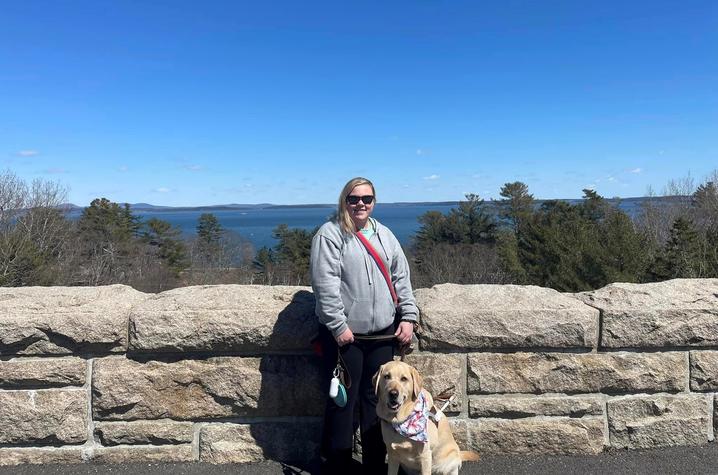Public Health alum makes life more accessible for others with disabilities

LEXINGTON, Ky. (July 19, 2023) — Since growing up in Frankfort, Kentucky, every day still presents some challenges for University of Kentucky College of Public Health (CPH) alumna Sydney Clark.
She was born with a genetic condition that resulted in losing her vision over time. However, Clark never allowed her disability to stop her from achieving her academic and professional goals — attending the University of Kentucky and becoming a public health influencer and champion.
“I’ve always been passionate about disability and emergency preparedness,” said Clark. “With 25% of our population having a disability, disabilities should not be an after-thought. They should be thought of beforehand.”
When she first enrolled at UK, many instructors were unaware of the resources and considerations needed for students who are blind. Fortunately, Clark had a great support system at the UK College of Public Health that helped her navigate her way through a myriad of science courses and graduate.
“I loved everyone at CPH,” said Clark. “The professors really care, and they all made a sincere effort in helping make classes more accessible.”
After graduating with her bachelor’s degree in public health in 2017 from UK, Clark then got her master's degree in public health at Western Kentucky University and did research on disability inclusion, and emergency and disaster preparedness.
While she first worked as an epidemiologist in Kentucky, Clark is now a disability and preparedness specialist for the Tennessee Department of Health, a state agency with the mission of protecting and improving the health of people in the state of Tennessee.
“We are researching and bridging the gaps between disabilities and emergency preparedness every day,” said Clark. “I’m excited to be collaborating and communicating with stakeholders that will help us give voice and solutions to those that sometimes are forgotten.”
Clark is working on building partnerships with the Association of State and Territorial Health Officials, which represents the public health agencies of all states in the U.S. and the approximately 100,000 public health professionals those agencies represent.
A project she is working on at TDH is creating statewide disability, functional and access needs work groups. The purpose of this resource is for anyone to use it as a quick reference guide for knowledge on ways to assist more appropriately someone in a time sensitive situation.
“These projects include a tips document for assisting people with functional and access needs during emergencies and disasters,” said Clark. “Furthermore, it contains different types of disabilities including visual impairment, DEF/hard of hearing, mobility impairment, autism spectrum disorder and more."
Clark is also working on a Pictogram project, which involves creating a group of icons that can be used for communication in a public health situation, a point of dispensing, or a community reception center.
“Maybe someone is deaf or hard of hearing, doesn’t speak English, or is nonverbal,” said Clark. “Whatever the situation may be, this will be an alternative form of communicating if the traditional form is not the most efficient. We want this to eventually become a database of icons that can be customized for any situation or specific population based on need.”
In addition, some of her other projects have included examining emergency plans for inclusivity and providing preparedness for people that need electronic medical devices.
Being a health champion has always been important to Clark. Now, that goal has manifested into helping other people like her.
“I have a disability. I’m blind. I know what you go through,” said Clark. “Public health should be universal and equitable. I’m in a position where I can get people connected that can help make a difference.”
Regarding a career in public health, Sydney offers advice for future students.
“This is a versatile career path," she said. "There is so much you can do to make an impact. If you want to help people and make a difference, I cannot think of anything better.”
Disability Pride Month is celebrated every July and is an opportunity to honor the history, achievements, experiences, and struggles of the disability community. July marks the anniversary of the Americans with Disabilities Act, a landmark legislation that broke down barriers to inclusion in society. But barriers, challenges, and misconceptions still exist.
“I think just being open to having more conversations and asking questions is important,” said Clark. “So many people with disabilities get looked over or talked over or talked around. If everyone would just take the time to actually have those conversations, and realize that we are people too, it would just open the floodgates to realize that these things we see as taboo, or difficult, are not those things at all.”
Disability Pride Month, for her, relates strongly back to public health.
"Disability Pride Month is important because it is one month out of the year where the largest minority group in this country can start raising awareness and having conversations,” said Clark. “It’s important to me because it’s my life and it’s what I’m passionate about — not only personally, but professionally,"
To learn more about our programs, people, and passion for public health, visit cph.uky.edu.
As the state’s flagship, land-grant institution, the University of Kentucky exists to advance the Commonwealth. We do that by preparing the next generation of leaders — placing students at the heart of everything we do — and transforming the lives of Kentuckians through education, research and creative work, service and health care. We pride ourselves on being a catalyst for breakthroughs and a force for healing, a place where ingenuity unfolds. It's all made possible by our people — visionaries, disruptors and pioneers — who make up 200 academic programs, a $476.5 million research and development enterprise and a world-class medical center, all on one campus.




